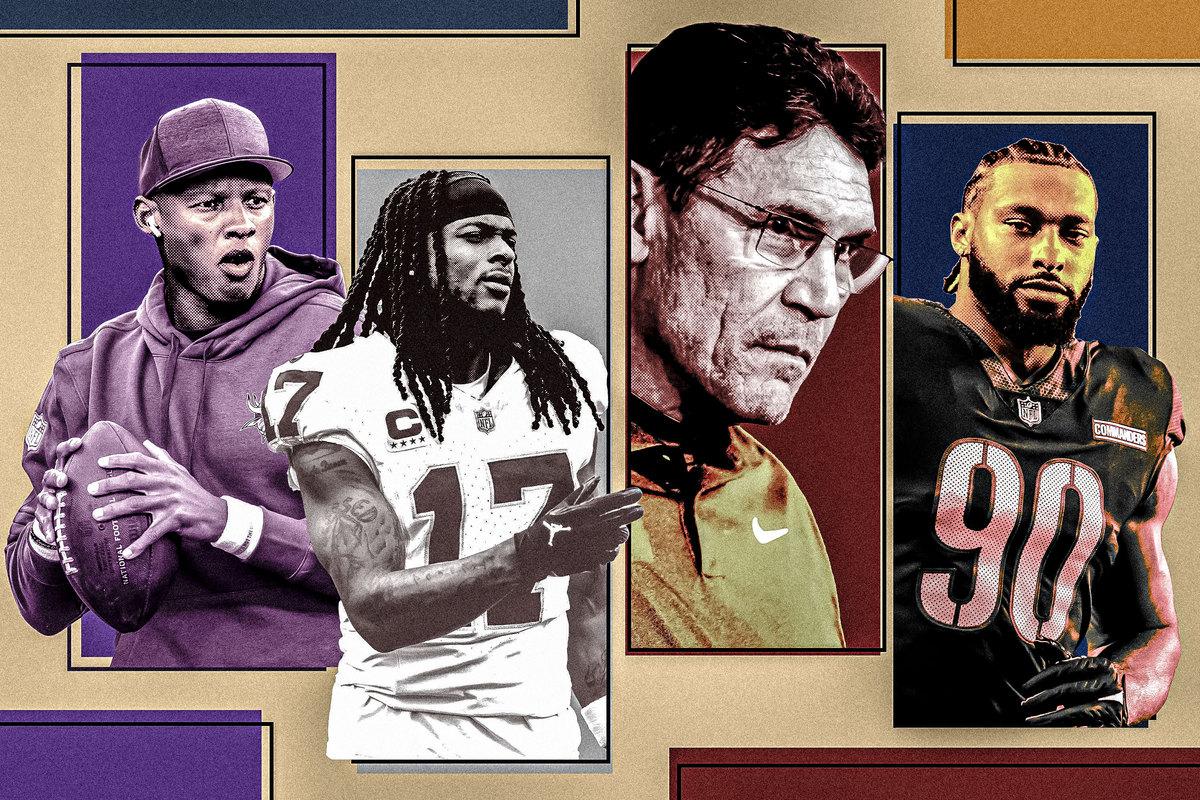The Winners and Losers of the 2023 NFL Trade Deadline
This trade deadline was one of the slowest we’ve had in recent years—with no first-round picks exchanged and very limited activity in the quarterback market. But some teams, like the Vikings and Eagles, managed to make the right moves anyway—and some players, like Davante Adams, are still stuck in NFL purgatory.
OK, we’ll say it: The 2023 NFL trade deadline was a bust. Sure, a handful of players are switching teams, but contending teams with roster holes largely stayed quiet (hey, Kansas City, are you sure you’re cool with that group of receivers??), and no teams gave up a first-round pick to acquire help. The closest thing we got to a fire sale was the Commanders shipping off a pair of former first-round defensive linemen, and the only quarterback on the move was Joshua Dobbs.
But even a snoozy trade deadline is impactful—for some individuals and teams more than others. Here are our winners and losers of the trade deadline:
(Editor’s note: This piece was written before the Raiders announced the firing of head coach Josh McDaniels and general manager Dave Ziegler late Tuesday night.)
Loser: All of Us
Riley McAtee: Tuesday was one of those days that makes you contemplate why the NFL trade deadline comes less than halfway through the season. This year, too many teams seemed to believe they’re in the playoff mix—or at least, didn’t feel desperate enough to do anything one way or the other. The Raiders, for example, are as hopeless as any team in the league, and they told 30-year-old star wideout Davante Adams to pound sand rather than trade him for assets that could help them in a (very inevitable) rebuild. The Bears are one of the worst teams in the league; they ended up adding Montez Sweat at the deadline. The Broncos have been out of it all season and were rumored to be looking at moving either Jerry Jeudy or Courtland Sutton (or both!), but a big win over the flu-stricken Chiefs on Sunday seems to have convinced them to stand pat. On and on it goes—teams that need to tank stuck with their rosters, teams that are primed for a playoff run didn’t make a big splash, and players who need a change of scenery were left twisting in the wind. And for us fans, it was all massively anticlimactic.
In 2012, the NFL moved the trade deadline back from Week 6 to Week 8, to encourage more trade action at the deadline. The results have been a mixed bag—that trade deadline in 2012 saw just two deals, but fast-forward to 2021 and 2022, and NFL teams were making a record amount of trades at the deadline. This year was, sadly, another dud. Those will happen—not every year can have teams going all in—but it still raises the question: Why can’t we just push the deadline back a few more weeks? The season is 18 weeks long now—shouldn’t the deadline move back at least one week, thereby coming at the season’s midway point? Or why not even later, closer to Thanksgiving?
Teams were asking that very question just last year, with ESPN’s Adam Schefter reporting “Multiple teams reached out to the NFL office this past week to inquire about pushing back the trade deadline from its current spot after Week 8 to after either Week 10 or Week 12.” That was after the busiest deadline in history. Expect that question to get some renewed focus after this year’s stinker.
Loser: Davante Adams
Ben Solak: I feel just terrible for Davante Adams. How can you not? He got out of Green Bay when things started to go south there (imagine Adams stuck on this version of the Packers offense—not good!) and landed in Las Vegas with a massive contract and his old college quarterback in Derek Carr. Life was supposed to be good—and it was last season, when he did the typical star-wide-receiver things: get thrown many passes, catch many of them, score many touchdowns. Things of that nature.
Now? Adams is furious on the sideline as Jimmy Garoppolo misses him in wide-open space. Josh McDaniels, the offensive designer in Las Vegas, seems entirely unperturbed by long stretches of gameplay in which Adams sees no targets. At 30 years old, still wildly talented, and stuck on a team with no chance of competing and likely to begin a substantial rebuild, Adams looked like a prime trade deadline candidate.
But he wasn’t moved. Bleacher Report’s Jordan Schultz reported that Adams approached the team about a potential deal, and that the Raiders quickly shot it down.
The Raiders can ignore the reality of their situation all they like. They’re gonna have to tear down and rebuild sometime soon. Refusing to trade Adams now means they’ll just face the same decision next offseason, and the offseason after that, on and on until they finally move on. So long as they still get a good return for Adams when they do trade him, this costs them very little besides time.
But it costs Adams a lot. He still has to play every Sunday, risk major injury, and run some cardio while the play caller doesn’t do enough to get him the football; while the quarterback misses him on open routes. Congrats to the Raiders for going 6-11 instead of 5-12.
Winners*: Minnesota Vikings and Joshua Dobbs
Steven Ruiz: After spending the first six years of his professional career living in relative anonymity as a backup QB, Joshua Dobbs can’t stay out of the NFL spotlight. OK, that’s a bit of an exaggeration, but it feels like we can’t go a month without getting a “BREAKING: QB Joshua Dobbs traded” alert on our phones, and we just got another one this afternoon when the Cardinals shipped him to Minnesota while swapping late-round picks.
Since last Thanksgiving, Dobbs has been waived by Cleveland, signed to Detroit’s practice squad, signed by Tennessee to start what was essentially a Week 18 postseason play-in game, signed a $2 million deal to return to Cleveland in March only to get traded, along with a seventh-rounder, to Arizona for a fifth-round pick in August. And now he’s been traded again—this time for a sixth-round pick. He’s been employed by five NFL franchises over the past calendar year and still has a few weeks to fit in a sixth if things don’t work out in Minnesota. He’s speed-running Josh Johnson’s career.
If the Vikings are going to come out of this as “winners” (hence the asterisk above), they’ll need to put Dobbs’s literal mobility to good use. The Cardinals have already laid the blueprint by running a discount version of the Eagles’ Jalen Hurts offense, with QB option runs and RPOs serving as the foundation of the scheme. Dobbs may not have been a good quarterback in Arizona, but he proved to be a useful one, especially in the run game, where the Cardinals rank 11th in expected points added per play this season, per RBSDM.com. His usefulness in Minnesota will be dictated by how Kevin O’Connell leverages Dobbs’s ability in the run game. Plugging him into an offense designed for Kirk Cousins and expecting it to work will lead to disastrous results.
That Minnesota went against type to fill the void created by Cousins’s season-ending Achilles injury suggests this won’t be a plug-and-play situation, and indeed, O’Connell has already said rookie Jaren Hall will start this week against Atlanta, giving the Vikings time to prepare for a Dobbs-led offense. The Vikings could have gone after a more similar QB with experience in O’Connell’s system—Colt McCoy, for instance—but instead went for a guy who will add another layer to an offense that has produced just league-average results so far this season. If Dobbs can boost a run game that ranks 22nd in EPA per play, it will help offset what they’re losing in the pass game without Cousins at the very least.
Minnesota was in a tough spot after losing its pricey starting quarterback for the season, but GM Kwesi Adofo-Mensah and the coaching staff found a viable replacement without overpaying. That’s a W.
Loser: Ron Rivera
Sheil Kapadia: Let’s be clear here: At 3-5, the Commanders’ chances of making the playoffs were already low. The DVOA model had them at just 8.7 percent after Week 8. But guess what happens when you trade away your good players: Your playoff odds shrink even more!
From a team-building perspective, I have no real objection to the Commanders trading former first-round picks Montez Sweat and Chase Young, both edge rushers who are scheduled to be free agents at the end of the season. You can make the case that teams should try to keep good, young players. But the Commanders are a franchise in transition. It’s reasonable to move those players for draft capital.
So why is Rivera a loser? Because the Commanders have made their intentions clear. They’re not trying to win this year. They’re looking ahead to 2024 and beyond. And that likely means a future without Rivera. New ownership will want to bring in their own people and start anew, from the coaching staff and front office on down.
To be fair, the chances of Rivera hanging on beyond this season were already low. The team is 25-32-1 since he was hired by former team owner Daniel Snyder in 2020. But his best shot to keep his job would’ve been for the Commanders to make a run in the second half of this season and sneak into the playoffs. Now, he’ll spend the next couple of months directing an organization that is not motivated to win. And come January, the most likely scenario is that Rivera will be looking for a new job.
Winners: The Eagles and Trader Howie Roseman
Nora Princiotti: I spent some time talking about Ezra Cleveland on Tuesday, which tells you all you need to know about the trade deadline this year. There were a few moves, but with very few teams clearly out of contention, it seemed like it was hard to get deals done. Fifteen of the AFC’s 16 teams are within three wins of each other. There are only two NFC teams further than two games out of the current playoff picture. Teams like the Bears, which should have been selling, ended up buying, and would-be contenders like the Cowboys didn’t end up doing anything to improve their roster for a playoff push. A lot of would’ve, should’ve, could’ve going around.
And then there’s Roseman. The Eagles general manager made a prudent trade for former Titans safety Kevin Byard last week, sacrificing safety Terrell Edmunds plus 2024 fifth- and sixth-round picks for the two-time All-Pro who’s an immediate upgrade at the position and could meaningfully help Philly come January. Never mind that the real pressure of the deadline was a week away. Never mind that the Tennessee front office should have Roseman’s number blocked. Just a contender that added a useful player without paying a premium.
The Eagles got better, but elsewhere in the division, Dallas did nothing and the Commanders sold low on Chase Young and Montez Sweat. The 49ers, losers of three straight but still Philadelphia’s main competition in the NFC, did add to their defensive line by trading a third-round pick for half a season of Young. So the Eagles aren’t the only ones who got better, but still, they are a—if not the—winner of the trade deadline, and they finished up their business before last weekend. How does he keep getting away with this?
Loser: Jameson Williams
Danny Kelly: I don’t think the Lions’ decision to trade for Donovan Peoples-Jones on Tuesday has me ready to close the book on Williams for the long term. He’s just too talented. But this move does feel like a pretty damning indictment when it comes to the question of whether Williams can contribute in any meaningful way this year. On the surface, Detroit’s front office can say it’s just adding depth to the receiver position, particularly since Marvin Jones Jr. is stepping away from the team to address personal matters—but I’m not sure this is the type of move the Lions would make if their 2022 first-rounder looked anywhere near ready to carve out a bigger role in the offense. Because he just hasn’t. And the Lions coaching staff hasn’t been real open to giving him more opportunities on the field.
Williams did miss a big chunk of his rookie season due to an ACL injury, sure, but even when he was cleared to get back on the field last year, he played minimal snaps and produced little. This season, he missed the first four games due to a gambling-related suspension. And since returning to the team, he’s played on just 38 percent of the team’s offensive snaps over four games and has caught just six passes for 71 yards … while being credited with five drops. Yeesh.
I’m sure the Lions will keep Williams in their long-term plans. But it’ll be a tough look if and when Peoples-Jones plays in front of him down the stretch.
Loser: The Always Confounding Chicago Bears
Danny Heifetz: There’s a meme of a dog hiding in a bunch of sheep with the caption: “Who doesn’t belong?” That’s the Bears at this trade deadline. Every team that traded a draft pick to acquire a veteran this week is trying to make a push for the playoffs or a Lombardi Trophy. Everyone except the Bears, who acquired Washington defensive end Montez Sweat for a second-rounder despite sitting at 2-6.
Sweat, a drafted in the first round out of Mississippi State in 2019, can certainly help a Chicago pass rush that ranks dead last in the NFL, with 10 sacks. But Chicago is projected to have the most cap space of any team next year, and Sweat is due to be a free agent after this season. Why did the Bears trade a (likely) top-40 pick for the right to sign Sweat to an extension rather than signing Sweat or a similar pass rusher in free agency while keeping the draft pick? Do the Bears feel that they will get such a discount on Sweat’s contract extension by trading for him that it justifies burning the second-rounder? Or do the Bears feel Sweat is such a game changer that getting him in the building early (and potentially making him more agreeable to sign with Chicago) is worth a second-rounder? And did Chicago really feel that Sweat is worth a draft pick 60 spots earlier than what Washington got for defensive end Chase Young, or did Chicago just get played?
Perhaps Sweat can transform himself from the B-plus player he was in Washington to an A in Chicago. Those types of pass rushers are hard to find outside the first round, and Chicago will likely be spending its first-rounders on quarterbacks and receivers this year. But if Sweat is anything other than a game changer, this is a tough deal to justify—especially after lighting last year’s no. 32 pick on fire to acquire Chase Claypool, whom the Bears flipped for a sixth-rounder in an ick swap less than a year later. Now, the Bears must sign Sweat, because if he leaves in free agency and the Bears waste two second-rounders two years in a row, general manager Ryan Poles will be the one trying to blend in and hoping nobody notices he got fleeced.
Winner: Bill Belichick’s Record Chase (Loser: Patriots Fans)
Austin Gayle: Don Shula lives rent-free in Belichick’s head at this point. Rather than punting on a lost season and selling off any of their numerous expiring contracts for future draft capital, Belichick—who, like it or not, will still be at the helm beyond 2023—stood pat at this year’s trade deadline. It’s reported that no one called with trade interest for veteran running back Ezekiel Elliott or quarterback Mac Jones (shocker), but there was interest for guys on expiring rookie deals like safety Kyle Dugger, offensive lineman Michael Onwenu, and pass rusher Josh Uche. Why keep them all? So Belichick can notch a few more wins in his pursuit of Shula’s record while the Pats finish fourth in the AFC East? Is that really the plan?
Jones isn’t the short- or long-term answer at quarterback, so paying a bunch of money to sign all of these former draft picks, which the Patriots usually don’t do, doesn’t match their timeline at all. I’m afraid Belichick’s inability to deconstruct the roster and rebuild will ultimately keep New England in purgatory until Belichick strings enough putrid seasons together to get the 29 (!!) wins he needs to pass Shula for the career wins record.
An earlier version of this piece incorrectly stated that the New York Giants reportedly tried to trade Adoree’ Jackson to the San Francisco 49ers but didn’t submit paperwork in time. The mention has been removed from this piece.


